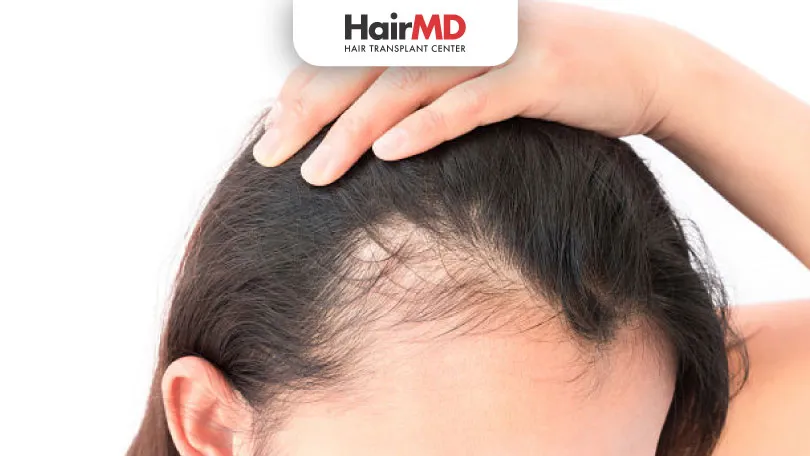15th Jan, 2024

What’s covered in the article?
- Scarring vs Non-scarring Alopecia: Know the Difference
- Conclusion
Scarring vs Non-scarring Alopecia: Know the Difference
| Scarring Alopecia | Non-Scarring Alopecia |
| The hair follicles are permanently destroyed, and fibrous scar tissue develops in the place of hair follicles. There is no scope for hair growth. | Hair follicles are preserved so there is potential for hair regrowth in the future. |
| The hair loss is irreversible. | The hair loss is reversible. |
| It is a rare hair condition. | It is a relatively common hair condition. |
| There is inflammation on the scalp. | There is no inflammation and the skin irritation is minimal. |
| The symptoms of scarring alopecia include itching and burning of the scalp, blisters, rough, scaly skin, and crusting. | The symptoms of non-scarring alopecia are based on the cause of this hair condition. Itching or burning of the scalp is hardly experienced. Blister formation, roughness, and scaling of the skin or crusting are not present in non-scarring alopecia. |
| Pus discharge from the scalp is another symptom of scarring alopecia. | Non-scarring alopecia is not characterized by pus formation. |
| Pain may be experienced in the scalp region. | Pain is minimal and experienced rarely. |
| The main cause of scarring alopecia is the destruction of hair follicle stem cells. A proliferator-activated receptor (a receptor protein) is thought to be another cause of scarring alopecia. Alteration in lipid metabolism, genetic factors, injuries and burns, and inflammation are among the other important reasons behind scarring alopecia. | The causes of non-scarring alopecia include autoimmune response, infection, hormonal imbalance, and stress. Exposing the hair to heat or harsh chemicals, or styling in a way that pulls the hair may also lead to non-scarring alopecia. Nutritional deficiencies as also certain medicines can cause non-scarring alopecia. It can also develop due to some other underlying health condition. |
| The treatment of scarring alopecia is focused on reducing the symptoms of inflammation. Covering the bald areas and preventing further hair loss are the main goals of scarring alopecia treatment. Primary excision, local flaps, tissue expander, and hair transplant are among the surgical treatments for scarring alopecia. | A different treatment method is advisable for each type of non-scarring alopecia. Steroids, immunotherapy, PRP, minoxidil, and hair transplantation are the primary treatments for non-scarring alopecia. If the cause of non-scarring alopecia is a nutritional deficiency, stress, or exposure to heat or chemicals, or if it has resulted as a side effect of a certain medication or therapy, eliminating that cause can help restore hair growth. |
Do You Know?
Nearly 250 Patients Visit HairMD
Everyday For Various Hair Concerns?
(Your journey to healthier and fuller hair starts here!)
Meet Our Dermatologists
Conclusion
Understanding the difference between scarring and non-scarring alopecia is crucial for determining the appropriate treatment plan. While both conditions result in hair loss, scarring alopecia causes permanent damage to hair follicles, leading to irreversible hair loss. On the other hand, non-scarring alopecia often allows for hair regrowth with the right treatment. Early diagnosis and intervention by a dermatologist can help manage these conditions effectively and prevent further progression.
This was an overview of scarring vs non-scarring alopecia. For expert advice on the differences between the two conditions, and their diagnosis and treatment, consult a dermatologist. HairMD, a reputed hair transplant centre in Pune, is one of the best places to approach for any advice regarding alopecia or any other hair condition. They have a team of experienced dermatologists and surgeons, who specialize in treating hair conditions. Their reliable guidance will help you attain healthy hair.
Further Reading
Can Rainwater Cause Hair Loss? Understanding the Impact
Find out if Rainwater Cause Hair Loss & how to keep your hair safe during the monsoon season. Expert tips for keeping your hair healthy in rainy weather!
Monsoon Hair Care Tips | Healthy Hair in Every Season
Beat frizz, dandruff, and breakage this monsoon with our monsoon hair care tips. Get advice from a dermatologist in Pune to keep hair healthy all season!
Is Synthetic Hair Transplant Permanent?
Wondering if synthetic hair transplants last forever? Discover how long they last, benefits, risks & more at HairMD, your expert hair clinic in Pune.
Role of Genetics in Hair Loss and Restoration
Discover how genetics influence hair loss and what treatments like FUE, PRP, and GFC can restore hair naturally. Visit HairMD Clinic Pune for expert care.
Have thoughts? Please let us know
We are committed not only to treating you, but also educating you.










